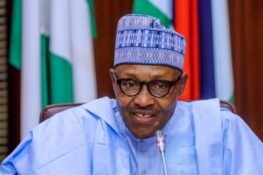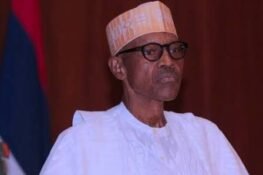When the crude oil age is over, the challenges of national development will be enormous and it will take the stroke of a genius to keep Nigeria from the dark bottom of the human development index.
Nigeria’s profligate use of oil wealth is historic and the prodigal must pay the price in some ways. It is, however, possible to mitigate the effects with proper response and planning.
The age of oil is winding down and renewable energy is taking over.
While, all levels of our government are aware the national cake is now leaner and the gush will later come in drips, it is perturbing that administrators, knowing what they know, are doing little planning to keep Nigeria from failing.
Other nations falling under the same condition have been taking action over many years or have swung into high gear.
It makes no sense that Nigeria has continued her dependence on petroleum as if fossil fuel has a future. Petroleum will never again provide Nigeria the wealth that could sustain national development.
This is a fact, and the reason why Nigeria now rakes more revenue from remittances by the Diaspora.
While the glory of oil has faded from the time when it was the source of 98 per cent of national income, Nigeria continues to ignore the fundamentals by planning on oil proceeds.
While, all levels of our government are aware the national cake is now leaner and the gush will later come in drips, it is perturbing that administrators, knowing what they know, are doing little planning to keep Nigeria from failing
Not even Saudi Arabia, the behemoth of OPEC, believes any future is possible on the promise of petroleum. Nations are moving on but Nigeria has stopped dead in her track like a deer hit by car headlights.
The 2015 Paris climate agreement has been the game changer and the nail on the coffin of OPEC and its oil-rich nations like Nigeria. At that summit, nations agreed that carbon emissions was a danger to earth’s survival.
Today, ExxonMobil and BP engineers are working on advanced batteries, Royal Dutch Shell scientists are working on hydrogen fuel cells, Saudi Arabia is investing in Tesla, a company that makes electric cars only, according to a report about the future of oil in the New York Times.
It has been projected that the global demand for oil will peak 10 years from now, after which the industry will experience a steep decline leading to its death.
Nations are creating plans to outlaw cars that do not run on clean energy.
An oil producing nation, Norway has a firm petrol car ban deadline of 2030. China, the world’s largest car market, plans to ban the production and sale of vehicles powered only by fossil fuels. So are India, France and Britain.
The move away from petrol-powered cars leaves Nigeria in a bad spot.
Petroleum will never again provide Nigeria the wealth that could sustain national development. This is a fact, and the reason why Nigeria now rakes more revenue from remittances by the Diaspora
It is puzzling that instead of analyzing the trend, some Nigerian policy and law makers are talking about banning the importation of electric cars in Nigeria as a response. What effect will that have on Nigeria’s economy?
Nigeria has been immensely blessed. We have had our run and could have used oil money to turn our country into a paradise, but we lacked the vision and discipline.
We passed through such good times that people from Ghana, India, Pakistan, Sri Lanka, among others, envied and flocked to Nigeria to work. By 1973, Nigeria was so awash with petrodollar that the Head of State, General Yakubu Gowon, famously declared that Nigeria’s problem was not finding money but how to spend it.
At one point, he gave every working Nigerian a generous bonus called the Udoji Awards.
University students got free education, free boarding, free food, free allowance and sometimes spent vacations abroad.
Commodities flowed through the ports so much that it caused an armada on our shores. Every family could afford cars and all kinds of imported goods. We lived comfortably.
Between 1958 and 1983, an estimated $101 billion had been received as income from oil. Along with the prosperity came corruption.
Soldiers, who ruled during the good times, stole as much as they could, working with their civilian helpers. Mansions sprung up and Nigerian officials became the darling of Swiss bankers, as they siphoned public money into private accounts.
The industries that sustained Nigeria, from mining to agriculture, were left to crumble.
Nigeria was once the world’s largest exporter of cocoa, but after the discovery of oil, the production of cocoa dropped by 43 per cent.
It has been projected that the global demand for oil will peak 10 years from now, after which the industry will experience a steep decline leading to its death
A similar fortune befell other income generators like rubber groundnuts, cotton and tin, where production plummeted because of oil.
Nigeria has had many opportunities to prepare the economy for a time like this, when oil will no longer provide the force to sustain growth.
The first warning was in the early 1980s, when oil price fell sharply, leading to Nigeria’s first economic meltdown. A recovery programme, tagged Austerity Measures of 1982, was just a plan.
As things picked up during the Iraqi war, we soon forgot our suffering. The windfall that was received between 1990 and 1991, instead of being used for planning and investment, was again wasted by the Ibrahim Babangida military administration.
While the nation was sweating under a crushing foreign debt, an estimated $12.5bn in revenues were stolen. Nigeria relapsed into another period of excruciating austerity. The lesson was not learned.
Yet, there was another opportunity. By the turn of the century, oil prices began to gain altitude. The pipelines became exceedingly profitable.
The price of oil rose to unimaginable heights and as with their military counterparts, the civilian administrations of Obasanjo, Yar’Adua and Jonathan spent profligately.
By one account, Nigeria collected over 77 trillion naira between 1999 and 2015. Although, one could cut Obasanjo some slack for paying off national debt to foreign creditors, a lot was still wasted even under him.
Anti-corruption bodies set up by the government to rein in theft soon became weakened by either internal corruption or diversion of attention to political witch-hunting.
That seemed to be the final opportunity because while politicians wasted the oil wealth, a tsunami was forming against Nigeria’s single source of income. Significant changes were taking place that would forever turn the tide on expensive fossil fuel.
Nigeria has been immensely blessed. We have had our run and could have used oil money to turn our country into a paradise, but we lacked the vision and discipline
The United States, not willing to continue reliance on oil from countries hostile to it, invested in new technologies to boost local production.
Shale oil, which was always available in abundance across America’s hinterland, could now be mined through a process called fracking.
By 2015, America had adopted the fracking technology so well that it surpassed Saudi Arabia as the world’s largest oil producer. The country that bought 70 per cent of Nigeria’s oil did not need to buy a single barrel by July, 2014.
This development happened while Nigeria’s economic minister, who had worked for Bretton Woods organisations, Ngozi Okonji-Iweala, boasted shale oil would not have any impact on Nigeria’s ability to sell.
Okonji-Iweala’s ignorance is still rubbing off on the do-nothing Buhari’s administration.
Today, India is the largest consumer of Nigerian oil.
However, India plans to ban petroleum-powered cars in 2030.
Early this year, the Indian government approved the Faster Adoption and Manufacturing of Hybrid and Electric Vehicles scheme, offering subsidies based on the battery capacity for automobiles. Nigeria will struggle to find buyers for crude oil.
The shift in paradigm was not just caused by technology. Many countries, including oil producers, have decided the benefits from fossil fuel are outweighed by the damage it does to the environment.
Nigeria was once the world’s largest exporter of cocoa, but after the discovery of oil, the production of cocoa dropped by 43 per cent. A similar fortune befell other income generators like rubber groundnuts, cotton and tin
They are now investing in green and clean energy, from solar, to electric cars, hydrogen, wind turbines, even hydropower.
Tesla, an 100 per cent electric car, has become the hottest selling automobile in the world -they can’t produce enough.
In Germany, sales of Tesla have leaped by over 400 per cent, while Nissan, Toyota and Honda are now selling hydrogen-powered cars.
The move away from petroleum energy is a perfect storm against the economic well-being of oil-producing countries, but a crippling disaster for profligate and wasteful nations like Nigeria which made no preparation. Owing to a lack of vision by a spendthrift and imprudent leadership, Nigeria is finding herself a nation without a reliable source of income, having to depend on the sweat of the Diaspora.
From an all-time high of $140 per barrel of oil in 2013, petroleum has since seen a low of $20 per barrel. Oil companies are cancelling exploration activities as they shift to alternative sources of energy. The clock ticks on petroleum.
It is tragic that even with the writing on the wall, there is yet a lack of vision among successive administrators to diversify quickly and prepare Nigeria for a future without oil. State governors still go to Abuja like alumajiris every month, stretching forth ugly hands to receive their proceeds of oil money. It does not matter that this source of income is drying up.
By 2015, America had adopted the fracking technology so well that it surpassed Saudi Arabia as the world’s largest oil producer. The country that bought 70 per cent of Nigeria’s oil did not need to buy a single barrel by July, 2014
All levels of government continue to hold out hands for oil proceeds while swimming under enormous debt. A friend who works for the Osun State government told me earlier this year how the state’s monthly allocation from oil was smaller than the salaries of state workers.
Nigeria sits in the eyes of a potentially-devastating hurricane, and she makes no preparation to avoid it.
Our country has today become an oil-dependent, but not an oil-rich, nation. The oil wealth is gone, most of it wasted.
And one thing is sure: there is definitely going to be a life after oil. What we are not sure about is how that life will look like in Nigeria.
Nations that have anticipated, planned and diversified can continue to enjoy their prosperity.
It is unlikely that Nigeria will be one of them – except something happens, quickly, dramatically. With population explosion predicted to make landfall soon, Nigeria cannot just sit by for a double whammy.
The United Arab Emirates can point to a vastly developed economy that attracts trade all over the world from wise investments and diversification planning from oil wealth.
Dubai has become an economic honeypot. The nations in the Emirates have invested real money in foreign markets, aviation and other profitable sectors and are likely to continue to sustain the level of prosperity oil has allowed them to enjoy.
Our country has today become an oil-dependent, but not an oil-rich, nation. The oil wealth is gone, most of it wasted. And one thing is sure: there is definitely going to be a life after oil
Saudi Arabia may not yet be as successful, but can point to investments in infrastructure and her people.
Its public investment fund is among the largest sovereign wealth funds in the world, with total estimated assets of $320bn. Saudi Arabia’s Crown Prince, Mohammed bin Salman, has said this fund will surpass its target of $600 billion by 2020, as part of a plan to reduce the economy’s dependence on oil.
Norway not only maximized earnings from oil, it invested its petrodollars to create and sustain other industries that make it competitive on the international market. Canada will not become poor without oil.
We cannot say the same for Nigeria, where, like other sub-Saharan African nations such as Angola and Equatorial Guinea, corruption delivered its expected result.
Instead of a massive public investment, all we can show five decades of prosperity are a few tall buildings, beautiful homes for a few at Lekki and Abuja, decaying infrastructure, a growing Diaspora population and Yahoo boys.
We are left with what a journalist called a rich nation with poor people. Nigeria is where you see Porsches in potholes.
All hope should not be lost. The government can still unleash our people’s innovative spirit if it tries.
We can create a new society that thrives on knowledge, creativity and production. Our emergency contractors can start agricultural production and smart technologies.
The environment can to exist for innovation and hard work to thrive – and laziness to choke.
We may have wasted an endowment, but we are the same country that once exported cocoa, rubber, groundnut and tin. If it was once possible with good leadership and an application of probity in public life, we can do it again.
If we do change our ways, there could be a good life after oil.








